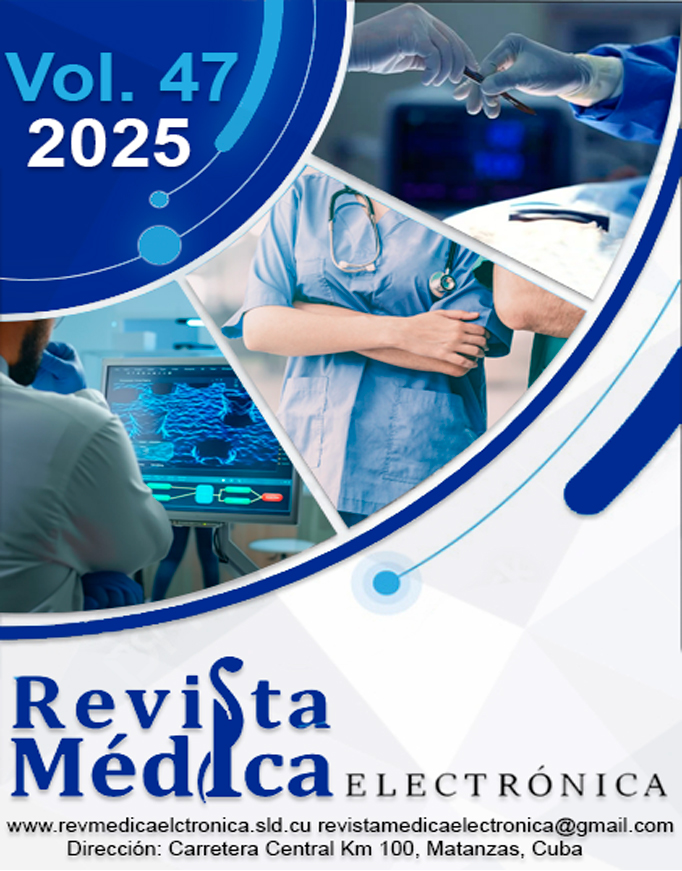Social contribution of nursing in disciplinary advancement
Keywords:
contribution, nursing, academia, science, technologyAbstract
Introduction: Society demands that Nursing graduates meet health-related needs, which guarantees their social relevance; for this, as justification, it is useful to know about their social contribution.
Objective: To delimit the social contribution of nursing in disciplinary advancement.
Methods: A qualitative methodology was applied, with a method of systematic reviews of articles indexed in high-impact databases such as Scopus and ScienceDirect. Ten articles from the last five years were obtained. The data were recorded in a systematization matrix of the findings. The technique of analysis of extracted documents was used, related to the social contribution of nursing in the disciplinary advancement. They were presented in codes, categories, and central themes.
Results: The results show four categories: scientific and theoretical advancement, which shows the social contribution of nursing; academic transformation, for disciplinary innovation in nursing; innovation in practice, for the social relevance in nursing; and technological empowerment for the social relevance in nursing. The discussion focused on these last four categories.
Conclusions: Nursing has become a discipline with a social and humanistic approach. It is recognized as a transforming science of understanding oneself and the other. Nursing is made visible in holistic and technological care.
Downloads
References
1. Sánchez Rodríguez JR, Morales Coronado CA, Burgos Maldonado MA. Procesos y estrategias de innovación curricular en la carrera de Enfermería. Universidad Arturo Prat, Chile. Educ Méd Super [Internet]. 2019 [citado 11/03/2024];33(2):e1526. Disponible en: https://www.medigraphic.com/pdfs/educacion/cem-2019/cem192m.pdf
2. Peters MDJ, Marnie C. Human costs of aged care productivity: Innovation versus staffing and skills mix. Collegian. 2021;28(3):351-5. DOI: 10.1016/j.colegn.2020.11.002.
3. Dönmez RO, Yardımcı E. Environmental awareness and sustainable consumption behaviours of Turkish nursing students. PeerJ. 2024;12:e17366. DOI: 10.7717/peerj.17366.
4. Nakayoshi Y, Takase M, Niitani M, et al. Exploring factors that motivate nursing students to engage in skills practice in a laboratory setting: A descriptive qualitative design. Int J Nurs Sci [Internet]. 2020 [citado 11/03/2024];8(1):79-86. Disponible en: https://pubmed.ncbi.nlm.nih.gov/33575449/
5. Papamitsiou Z, Economides AA. Exploring autonomous learning capacity from a self‐regulated learning perspective using learning analytics. Br J Educ Technol. 2019;50(6):3138-55. DOI: 10.1111/bjet.12747.
6. McAllister M, Kellenbourn K, Wood D. The robots are here, but are nurse educators prepared? Collegian. 2021;28(2):230-5. DOI: 10.1016/j.colegn.2020.07.005.
7. Zárate-Grajales RA, Ostiguín-Meléndez RM, Aristizabal P, et al. Predictors of nursing students' academic performance in the National Autonomous University of Mexico, 2010–2019: A retrospective study. Nurse Educ Today. 2021;100:104790. DOI: 10.1016/j.nedt.2021.104790.
8. Seah B, Ang EN, Liaw SY, et al. Curriculum changes for pre-registration nursing education in times of COVID-19: For the better or worse? Nurse Educ Today. 2021;98:104743. DOI: 10.1016/j.nedt.2020.104743.
9. Salminen L, Tuukkanen M, Clever K, et al. The competence of nurse educators and graduating nurse students. Nurse Educ Today. 2021;98:104769. DOI: 10.1016/j.nedt.2021.104769.
10. Oh J, Kim SJ, Kim S, et al. Development and evaluation of flipped learning using film clips within a nursing informatics course. Jpn J Nurs Sci. 2019;16(4):385-95. DOI: 10.1111/jjns.12245.
11. Karlsson M, Pennbrant S. Ideas of caring in nursing practice. Nurs Philos. 2020;21(4):e12325. DOI: 10.1111/nup.12325.
12. Thorne S. Rethinking Carper's personal knowing for 21st century nursing. Nurs Philos. 2020;21(4):e12307. DOI: 10.1111/nup.12307.
13. Burns M, Bally J, Burles M, et al. Influences of the culture of science on nursing knowledge development: Using conceptual frameworks as nursing philosophy in critical care nursing. Nurs Philos. 2020;21(4):e12310. DOI: 10.1111/nup.12310.
14. Haraldseid C, Friberg F, Aase K. Nursing students’ perceptions of factors influencing their learning environment in a clinical skills laboratory: A qualitative study. Nurse Educ Today. 2015;35(9):e1-6. DOI: 10.1016/j.nedt.2015.03.015.
15. Pepito JA, Locsin R. Can nurses remain relevant in a technologically advanced future? Int J Nurs Sci. 2019;6(1):106-10. DOI: 10.1016/j.ijnss.2018.09.013.
16. Escobar-Castellanos B, Cid-Henríquez P. El cuidado de enfermería y la ética derivados del avance tecnológico en salud. Acta bioeth [Internet]. 2018 [citado 18/11/2024];24(1):39-46. Disponible en: https://www.scielo.cl/scielo.php?pid=S1726-569X2018000100039&script=sci_arttext&tlng=pt
17. Sánchez-Ojeda MA, Segura-Robles A, Gallardo-Vigil MÁ, et al. Enfermería Transcultural. Formación de los futuros profesionales de Enfermería en España. Index Enferm [Internet]. 2018 [citado 18/11/2024];27(4):247-50. Disponible en: http://scielo.isciii.es/scielo.php?script=sci_arttext&pid=S1132-12962018000300015&lng=es
18. Ariza Olarte C. Desarrollo epistemológico de enfermería. Enferm Univ [Internet]. 2011 [citado 18/11/2024];8(2):18-24. Disponible en: https://www.scielo.org.mx/scielo.php?pid=S1665-70632011000200004&script=sci_arttext
19. Mohamadi Asl S, Khademi M, Mohammadi E. The influential factors in humanistic critical care nursing. Nurs Ethics [Internet]. 2022 [citado 11/03/2024];29(3):608-20. Disponible en: https://pubmed.ncbi.nlm.nih.gov/35144499/
20. Nurse-Clarke N, Joseph M. An exploration of technology acceptance among nursing faculty teaching online for the first time at the onset of the COVID-19 pandemic. J Prof Nurs. 2022;41:8-18. DOI: 10.1016/J.PROFNURS.2022.04.002.
21. Newman MA, Sime AM, Corcoran-Perry SA. The focus of the discipline of nursing. Adv Nurs Sci [Internet]. 1991 [citado 11/03/2024];14(1):1-6. Disponible en: https://journals.lww.com/advancesinnursingscience/citation/1991/09000/The_focus_of_the_discipline_of_nursing.2.aspx
22. Von Gerich H, Moen H, Block LJ, et al. Artificial Intelligence-based technologies in nursing: A scoping literature review of the evidence. Int J Nurs Stud. 2022;127:104153. DOI: 10.1016/J.IJNURSTU.2021.104153.
23. Jowsey T, Foster G, Cooper-Ioelu P, et al. Blended learning via distance in pre-registration nursing education: A scoping review. Nurse Educ Pract. 2020;44:102775. DOI: 10.1016/J.NEPR.2020.102775.
24. Van der Cingel M, Brouwer J. What makes a nurse today? A debate on the nursing professional identity and its need for change. Nurs Philos. 2021;22(2):e12343. DOI: 10.1111/nup.12343.
25. Middleton R, Fernandez R, Cutler N, et al. Students' perceptions of belonging in the School of Nursing at a regional university in Australia. Nurse Educ Today. 2021;99:104817. DOI: 10.1016/j.nedt.2021.104817.
Downloads
Published
Versions
- 2025-06-22 (2)
- 2025-01-01 (1)
How to Cite
Issue
Section
License
Copyright (c) 2025 Revista Médica Electrónica (Medical Electronic Journal)

This work is licensed under a Creative Commons Attribution-NonCommercial 4.0 International License.
All content published in this journal is Open Access, distributed under the terms of the CC BY-NC 4.0 License.
It allows:
- Copy and redistribute published material in any medium or format.
- Adapt the content.
This will be done under the following terms:
- Attribute the authors' credits and indicate whether changes were made, in which case it must be in a reasonable way.
- Non-commercial use.
- Recognize the journal where it is published.
The copyrights of each article are maintained, without restrictions.






